Related Research Articles
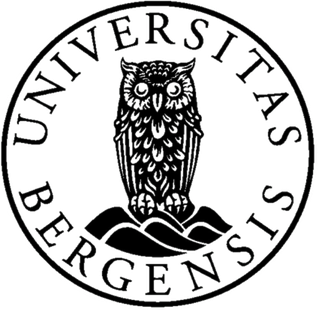
The University of Bergen is a public research university in Bergen, Norway. As of 2021, the university had over 4,000 employees and 19,000 students. It was established by an act of parliament in 1946 consolidating several scientific institutions that dated as far back as 1825. It is Norway's second-oldest university, and is considered to be one of the nation’s four so-called "established universities." It has faculties and programmes in all the academic fields typical of a classical university, as well as such degree programmes as medicine and law that, traditionally, only the “established universities” are authorized by law to offer. It is also one of Norway's leading universities in many of the natural sciences, including marine research and climate research. It has consistently been ranked in the top 200 or top one percent of universities in the world, and as one of the best 10 or best 50 universities worldwide in some fields, such as earth and marine sciences. It is part of the Coimbra Group and of the U5 group of Norway's oldest and highest-ranked universities.
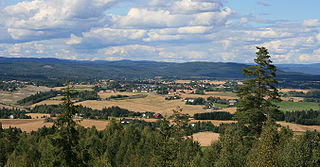
Gjerdrum is a municipality in Akershus county, Norway. It is part of the traditional region of Romerike.
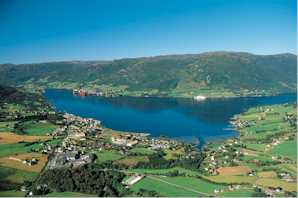
Ølen is a former municipality in the Vestlandet region of Norway. The municipality existed from 1916 until 2006, and originally it was a part of Hordaland county, but in 2002 it was transferred to Rogaland county prior to its dissolution in 2006. The 181-square-kilometre (70 sq mi) municipality was located on the south side of the Bjoafjorden and east of the Ålfjorden. The administrative center of Ølen was the village of Ølensjøen. The municipality of Ølen makes up the northern part of the present-day Vindafjord Municipality in Rogaland county.

Sola is a municipality and a Seaside resort in Rogaland county, Norway. It is located in the traditional district of Jæren. The administrative centre of the municipality is the village of Solakrossen. Other villages include Tananger, Hålandsmarka, Sørnes, and Stenebyen. Stavanger Airport is located in Sola, just a short distance from the large Stavanger/Sandnes metropolitan area.
The title of docent is conferred by some European universities to denote a specific academic appointment within a set structure of academic ranks at or below the full professor rank, similar to a British readership, a French maître de conférences (MCF), and equal to or above the title of assistant professor. In Southeast European countries, it is the first position that people achieve once they enter the University, and after the completion of their PhD degree.
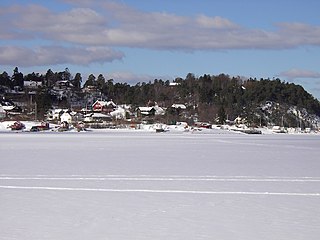
Malmøya is an island 4 kilometres (2.5 mi) south of Oslo Central Station. Oslo, the capital of Norway. The island is mostly known for its large quantities of fossils from the Cambro-Silurian period and its rare flowers. The name Malmøya is derived from 'malm', or 'ore', due to the extensive amount found on the island.

The Norwegian University of Life Sciences is a public university located in Ås, Norway. It is located at Ås in Akershus and has around 7700 students.

The IT University of Copenhagen is a public university and research institution in Copenhagen, Denmark. It is specialized in the multidisciplinary study of information technology within computer science, business IT and digital design.
Education in Norway is mandatory for all children aged from 6 to 16. Schools are typically divided into two divisions: primary and lower secondary schooling. The majority of schools in Norway are municipal, where local governments fund and manage administration. Primary and lower secondary schools are available free of charge for all Norwegian citizens as a given right.

Våle is a former municipality in Vestfold county, Norway. The 82-square-kilometre (32 sq mi) municipality existed from 1838 until its dissolution in 2002. The area is now part of Tønsberg Municipality. The administrative centre was the village of Kirkevoll. Other villages in the rural, agricultural municipality included: Brekkeåsen, Rånerudåsen, Svinevoll, Sørby, and Gretteåsen.
Examen philosophicum is, together with Examen facultatum, one of two academic exams in most undergraduate programmes at Norwegian universities. Whereas Examen facultatum aims at teaching students how to write academic texts, Examen philosophicum trains students in philosophy and structured thinking. Introduced at the University of Copenhagen in Denmark–Norway in 1675, Examen philosophicum was discontinued in Denmark in 1971 and exists in a reduced version in Norway.

Higher education in Norway is offered by a range of ten universities, nine specialised universities, 24 university colleges as well as a range of private university colleges. The national higher education system is in accordance with the Bologna process, with bachelor's degrees, master's degrees and doctoral degrees. Acceptance is offered after finishing upper secondary school and meeting general university admissions certification.
Sivilingeniør, is a legally protected engineering title awarded by technical universities in Norway. To qualify for the title, a student must follow a structured study programme in technology and natural sciences of 5 years duration at a Norwegian university or university college. Previously it was also a degree in and of itself, though today it is the equivalent of a Master of Science or Master of Technology degree. Before 1992, it was considered by the Norwegian Institute of Technology (NTH) to be equivalent to a Master of Science degree. Although the name is cognate with the English term civil engineer, the meanings do not correspond in modern usage.

The University of South-Eastern Norway, commonly known as USN, is a Norwegian state university. It has campuses in Bø in Telemark, Porsgrunn, Notodden, Rauland, Drammen, Hønefoss, Kongsberg and Horten. USN is a continuation of the three former university colleges, Telemark University College, Buskerud University College and Vestfold University College, which merged between 2014 and 2016 to form the University College of South-Eastern Norway. The institution was granted the status of a full university by the King-in-Council on 4 May 2018.
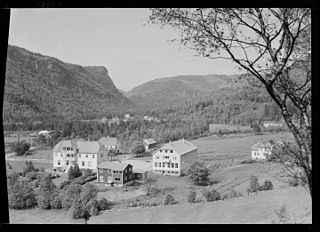
Kvås is a former municipality that was located in the old Vest-Agder county in Norway. The 116-square-kilometre (45 sq mi) municipality existed from 1909 until its dissolution in 1963. The municipality lies in what is now the central part of the municipality of Lyngdal. The administrative centre of Kvås was the village of Kvås where Kvås Church is located. Other villages in the Kvås area are Birkeland and Moi.
Examen facultatum is, together with Examen philosophicum, one of two academic exams in most undergraduate programmes at Norwegian universities. Examen facultatum is a result of theory of science being separated from Examen philosophicum as an independent type of course before 2000. Whereas Examen philosophicum trains students in philosophy and structured thinking, Examen facultatum aims at teaching students how to write academic texts, normally focussing on the scientific branch of each faculty and on the field of study of each undergraduate programme. It is common for universities to have a general course and a course specific part that intertwine with any chosen study as part of Examen philosophicum.
Legal education in Norway refers to a graduate professional degree that qualifies the holder for the legal profession, that includes advocates (barristers/attorneys-at-law), judges and other professions that lawyers have a legal monopoly on. Norway has a united and regulated legal profession where all lawyers hold the same professional degree obtained after an integrated and comprehensive 5-year university programme with highly competitive admission requirements, that gives the right to use the legally protected title lawyer and in itself qualifies for entry-level legal practice, i.e. the entry-level positions in the legal profession such as associate advocate, deputy judge or junior prosecutor. Norwegian lawyers are organized in the trade union Norges Juristforbund.
The Sandra Borch and Ingvild Kjerkol plagiarism affair refers to the Norwegian political scandal over two members of the Norwegian government's plagiarism of their master's theses. The affair started on 19 January 2024 when it was revealed that the Minister of Research and Higher Education, Sandra Borch, had plagiarized her master's thesis, resulting in her resignation the same day. The next day it was revealed that the Minister of Health Ingvild Kjerkol had plagiarized parts of her thesis and fabricated interviews with research informants, leading to calls for her resignation.

Sande is a former municipality in Vestfold county, Norway. The 178-square-kilometre (69 sq mi) municipality existed from 1838 until its dissolution in 2020. The area is now part of Holmestrand Municipality in the traditional district of Jarlsberg. The administrative centre was the village of Sande. Other villages in the municipality included Eikeberg, Klever, and Selvik.
References
- ↑ Parliament of Norway (no date). ‘Kompetansereformen’. Retrieved 19 Nov 2019 from https://www.stortinget.no/no/Saker-og-publikasjoner/Saker/Sak/?p=15481
- ↑ Government of Norway (no date). ‘NOU 2000: 14 : Frihet med ansvar — Om høgre utdanning og forskning i Norge’. Retrieved 19 Nov 2019 from https://www.regjeringen.no/no/dokumenter/nou-2000-14/id142780/
- ↑ Parliament of Norway (no date). ‘Gjør din plikt - krev din rett. Kvalitetsreform av høyere utdanning’. Retrieved 19 Nov 2019 from https://www.stortinget.no/no/Saker-og-publikasjoner/Saker/Sak/?p=21539
- ↑ Literal translation: self-chosen bachelor’s degree.
- ↑ Lovdata.no. ‘Forskrift om studier og eksamen ved Universitetet i Agder’. Retrieved 20 Nov 2019 from https://lovdata.no/dokument/SF/forskrift/2005-06-22-833
- ↑ Literal translation: freely composed bachelor’s degree.
- ↑ Lovdata.no. ‘Forskrift om studier og eksamener ved Universitetet i Oslo’. Retrieved 20 Nov 2019 from https://lovdata.no/dokument/SF/forskrift/2005-12-20-1798
- ↑ Literal translation: self-composed bachelor’s degree.
- ↑ Lovdata.no. ‘Forskrift om studier og eksamen ved Universitetet i Sørøst-Norge (USN)’. Retrieved 21 Nov 2019 from https://lovdata.no/dokument/SF/forskrift/2018-06-15-1090
- ↑ Literal translation: self-chosen bachelor’s degree.
- ↑ Lovdata.no. ‘Forskrift for graden bachelor ved Universitetet i Stavanger.’ Retrieved 20 Nov 2019 from https://lovdata.no/dokument/SF/forskrift/2005-12-06-1400
- ↑ Literal translation: bachelor’s degree in freely composed disciplines/courses.
- ↑ Lovdata.no. ‘Forskrift om studier ved Universitetet i Tromsø – Norges arktiske universitet’. Retrieved 20 Nov 2019 from https://lovdata.no/dokument/SF/forskrift/2008-12-12-1568
- ↑ Literal translation: self-chosen bachelor’s degree.
- ↑ Lovdata.no. ‘Forskrift om studier og eksamen ved Nord universitet’. Retrieved 20 Nov 2019 from https://lovdata.no/dokument/SF/forskrift/2019-01-31-63
- ↑ Literal translation: self-chosen bachelor’s degree.
- ↑ Lovdata.no. ‘Forskrift om studier og eksamen ved OsloMet – storbyuniversitetet’. Retrieved 20 Nov 2019 from https://lovdata.no/dokument/SF/forskrift/2012-06-26-718